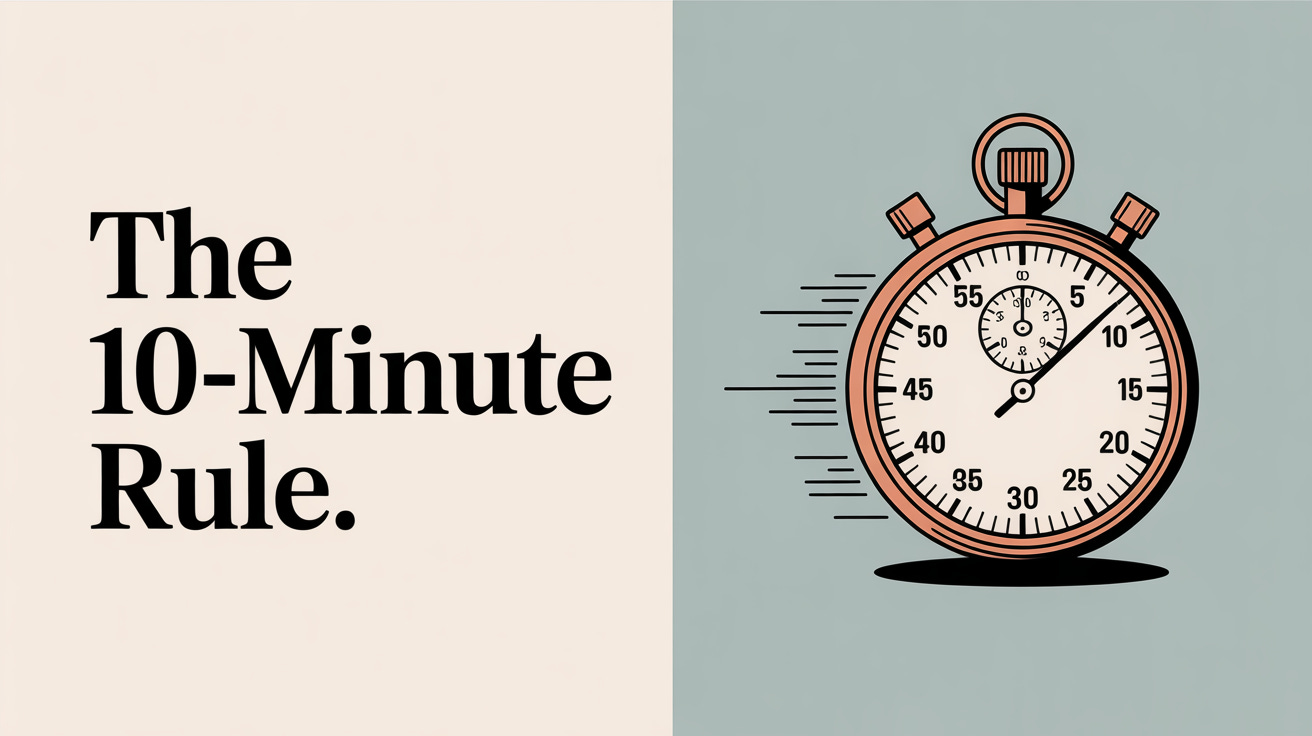The 10-Minute Rule: How Small Windows Create Big Wins
You don’t need more time. You just need to start before your brain talks you out of it.
We tend to think progress requires big blocks of time.
A full workout. A quiet hour to write. A perfect morning to reset.
But the truth? Most growth doesn’t happen in the big moments.
It happens in the small ones, the short windows you choose to use instead of waiting for the perfect setup.
That’s the mindset behind the 10-Minute Rule, a simple way to bypass procrastination, build momentum, and create real consistency.
The Psychology Behind “Just Ten Minutes”
Your brain resists big tasks not because they’re impossible, but because they look heavy.
It wants comfort, not challenge.
When you say “I’ll work for two hours,” your mind sees effort and risk.
When you say “just ten minutes,” it sees something manageable.
That small shift lowers resistance.
You start faster. You finish more often.
And the best part? Those short starts compound over time.
Because 10 minutes a day isn’t about the clock, it’s about building trust with yourself.
How the Rule Works
The 10-Minute Rule has only one rule:
When you don’t feel like doing something, do it for ten minutes anyway.
That’s it. No pressure to finish. No punishment if you stop.
Just start, and give yourself permission to stop after ten.
Most of the time, you won’t.
Once momentum kicks in, your resistance fades and your focus takes over.
And even if you do stop, you’ve still followed through.
That’s the part most people forget, the point isn’t the outcome.
It’s the consistency.
Why It Works
The 10-Minute Rule taps into three psychological truths:
1. Action Beats Motivation
Waiting to feel motivated is like waiting for a calm sea before you swim.
Motivation follows action, not the other way around.
Once you start, your brain releases dopamine, the “reward” chemical that fuels continued effort.
That’s why the first step is always the hardest, and the most important.
2. Small Wins Rewire Self-Trust
Every time you honor a small commitment, your subconscious records it.
It starts believing you again.
That’s the foundation of discipline: not punishment, but proof.
Ten minutes of focus daily builds more confidence than one “perfect” day followed by a week of guilt.
3. Momentum Is Contagious
When you start moving in one area, it spills into others.
A 10-minute stretch turns into better focus.
A 10-minute declutter makes you breathe easier.
A 10-minute walk clears your head for better ideas.
You begin to see discipline as energy, not effort.
How to Apply the 10-Minute Rule
Here’s how to make it part of your day without forcing it:
1. Choose a Focus Area
Pick one area where you often procrastinate, maybe journaling, cleaning, or exercise.
That’s your 10-minute zone.
2. Remove the Extras
You don’t need music, equipment, or a ritual.
Just start.
If you’re writing — open the doc.
If you’re cleaning — pick one surface.
If you’re reading — open the book.
Keep the friction low.
3. Set a Simple Timer
Ten minutes. That’s it.
No multitasking, no perfection, just focus.
If you keep going after ten, great.
If you stop, still great. You did what you said you would.
4. Track the Effort, Not the Outcome
Make a note or checkmark every time you use the rule.
Seeing that proof stack up builds identity, you become the kind of person who shows up anyway.
A Real Example
You come home tired. You were supposed to exercise, but you don’t have the energy.
So you tell yourself: “Just ten minutes.”
You stretch, do a few push-ups, maybe a short walk.
The timer rings. You could stop.
But now, you feel better, so you keep going another 10.
Even if you don’t, you did something.
And that something matters more than waiting for motivation that never comes.
Why This Matters
Discipline doesn’t come from doing more.
It comes from doing something, regularly, gently, imperfectly.
The 10-Minute Rule gives you permission to start small — and stay consistent.
Over time, it builds a quiet kind of confidence:
You stop saying “I’ll try.”
You start saying “I’ll begin.”
Final Thought
You don’t need the perfect morning, the free hour, or the big burst of energy.
You just need ten minutes, and the willingness to begin.
Because small starts create big wins.
And big wins?
They start right now.


